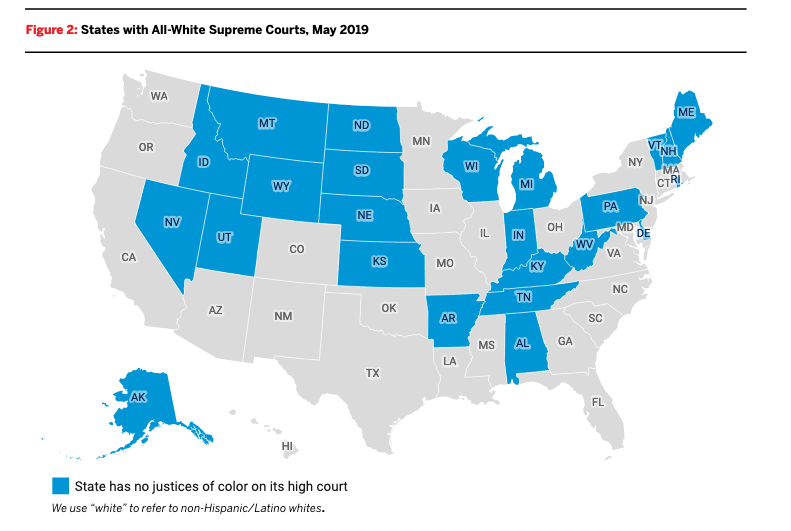Connecting state and local government leaders
In many states, the highest court lacks diversity. Thirteen supreme courts have never had a person of color serve on the bench, according to the Brennan Center for Justice.
Nearly half of state supreme courts currently have no judges of color—a glaring racial disparity that can undermine local communities’ trust in the judicial system, according to a new report.
The Brennan Center for Justice analyzed the racial and gender composition of all 50 state supreme courts, finding that both minorities and women are drastically underrepresented on the bench.
While women make up roughly half of the population, they hold only 36 percent of state supreme court seats. Meanwhile, 24 state supreme courts only have white judges currently serving. Since 1960, the report found 13 states have not had a single person of color serve on the high court bench.
State courts handle the bulk of cases filed in the U.S. court system—about 95 percent—and state supreme courts’ ability to set precedents that bind thousands of lower court judges underscores their influence on the American judicial system, said one of the Brennan report’s authors.
“In recent years, state supreme courts have reversed multimillion-dollar verdicts in commercial disputes, ordered hundreds of millions of dollars in additional funding for education, and struck down restrictive abortion laws, just to name a few impactful cases. So, they have tremendous power over issues that affect our day-to-day lives,” said Laila Robbins, a co-author of the report and research and program associate at the Brennan Center. “But in order for the courts to function, they rely upon the public’s trust. Our judiciary as a whole loses credibility when the judges making decisions don’t reflect the diversity of the people affected by those rulings.”
More than 83 million cases were filed in state trial courts in 2017, and more than 241,000 appeals cases were filed that same year, according to the Court Statistics Project.
Racial disparities within the criminal justice system have long been a focus for reform advocates.
Black people are currently 5.9 times as likely and Hispanics are 3.1 times as likely to be incarcerated than white people. Blacks and Hispanics comprise 57% of the U.S. prison population even though they make up 29% of the U.S. population, according to a report the Sentencing Project submitted to the United Nations last year on racial disparities in the American criminal justice system.
The Brennan Center report highlights just how skewed the racial make-up of states’ top law enforcers can be. Included among the 24 states with only white judges currently serving on the bench is Nevada, where people of color comprise 51% of the population, and majority-white states like Maine and Vermont, where people of color represent just 7% of the state population. State supreme courts vary is size from five to nine judges.

Five states—California, Connecticut, Minnesota, North Carolina, and Oregon—have a higher proportion of people of color on their state supreme courts than their minority populations as a whole.
Among the hurdles to a more diverse judiciary is the selection process for judges, the report states.
In the 22 states that have judicial elections, the report found that far fewer minority judges initially made it onto the bench through elections, and were far more likely to voted out after an interim appointment. Only 17 judges of color, or 4% of initially elected judges, reached the bench for the first time through an election between 1960 and 2018, according to the report. By contrast, 141 judges of color were initially appointed to the bench, representing 12 percent of all appointees.
Advocacy groups have raised concern in recent years about racial bias in judicial elections. In recent years, the Lawyers’ Committee for Civil Rights Under Law has filed two lawsuits to challenge election processes.
In 2016, the lawyer’s committee filed suit over Alabama’s at-large judicial election process. That case is still pending.
Last month it sued Louisiana, alleging the state’s system violated the Voting Rights Act. The lawsuit challenged Louisiana’s electoral map, which includes seven supreme court districts, including just one covering the New Orleans-area that is held by a black judge.
“Voters are left voiceless in places where we don’t have a fair method of electing judges, which is why we are pursuing the cases that we are pursuing in Alabama and Louisiana,” said Kristen Clarke, president and executive director of the Lawyers’ Committee for Civil Rights Under Law.
The Brennan Center has advocated previously for doing away with judicial elections, but stops short of making a recommendation in this report.
“That is one approach states can take,” Robbins said. “That’s not saying judicial appointments are fully representative either.”
But for states that do use judicial elections, public financing could be one option that opens the door for a pool of more diverse candidates to run, she said.
“We want judges who can understand and appreciate the varied life experience of people across our country,” Clarke said. “At the end of the day, fair courts may help to resolve some of the issues that we wrestle with in society today including the racial disparities that affect our criminal justice system.”
Andrea Noble is a staff correspondent for Route Fifty.

NEXT STORY: Study: No Link Between Gentrification and Displacement in NYC



